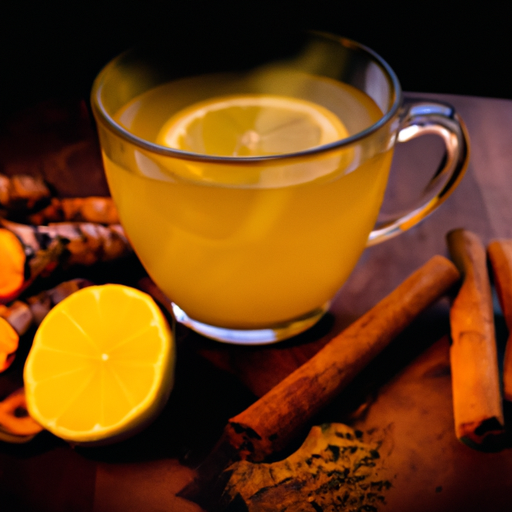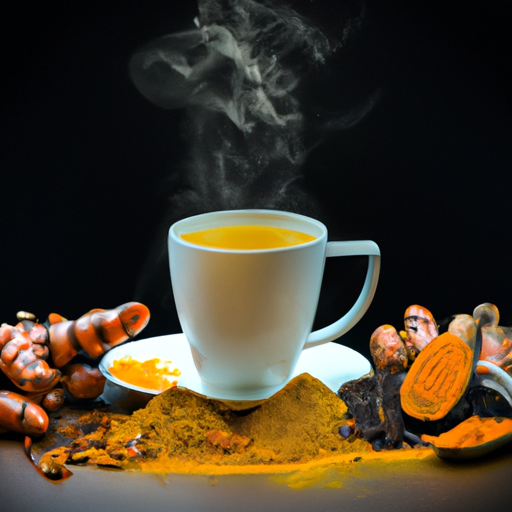Picture your blood coursing through your body like a finely-tuned engine, efficiently transporting oxygen and nutrients to each and every cell. But what happens when your blood thickens and slows down, putting you at a higher risk for potentially harmful blood clots?
This is where turmeric comes into play. Like a gentle breeze clearing away a fog, turmeric has been hailed for its potential to thin the blood and improve circulation. But is this just a myth or is there scientific evidence to support these claims?
In this article, we will delve into the world of blood clotting and explore the potential benefits of turmeric. We will uncover the active compound in turmeric, known as curcumin, and examine the studies that have investigated its impact on blood clotting. Additionally, we will discuss the interaction between turmeric and medications, proper dosage and preparation, as well as other factors that can affect blood thickness.
So, let’s separate fact from fiction and discover how turmeric can complement your approach to maintaining healthy blood flow.
Key Takeaways
- Turmeric contains curcumin, which has potential blood-thinning properties.
- Turmeric inhibits platelet aggregation and molecules involved in blood clotting, potentially preventing the formation of blood clots.
- Turmeric should not replace prescribed blood thinners without consulting a healthcare professional.
- Further research is needed to fully understand turmeric’s effects on blood thinning and cardiovascular health.
Understanding Blood Clotting and Thinning
So, you’re probably wondering if turmeric can make your blood thinner or thicker, right? Well, let’s dive into the world of blood clotting factors and natural remedies to find out.
Blood clotting is a complex process that involves several factors working together to stop bleeding and promote healing. These factors include platelets, proteins, and enzymes that form a clot at the site of injury.
When it comes to blood thinning, certain medications like aspirin and warfarin are commonly prescribed. However, some people prefer natural remedies like turmeric as an alternative. Turmeric contains a compound called curcumin, which has been shown to have antiplatelet and anticoagulant properties. These properties may help prevent excessive blood clotting and reduce the risk of heart disease and stroke.
Research on the effects of turmeric on blood thinning is still limited, and more studies are needed to fully understand its potential benefits. It’s important to note that turmeric should not be used as a replacement for prescribed blood thinners without consulting a healthcare professional. They can provide personalized advice based on your specific medical history and needs.
While turmeric may have potential benefits in terms of blood thinning, further research is needed to confirm its effectiveness.
Now, let’s move on to explore the potential benefits of turmeric in more detail.
The Potential Benefits of Turmeric
Turmeric has been studied for its potential benefits in various areas of health. One key aspect is its anti-inflammatory properties, which have been shown to help reduce inflammation in the body.
Additionally, turmeric has antioxidant effects, which can help protect cells from damage caused by free radicals.
Furthermore, there is emerging research suggesting that turmeric may have potential cardiovascular benefits, such as improving blood flow and reducing the risk of heart disease.
Anti-Inflammatory Properties
Imagine how incorporating turmeric into your diet can help reduce inflammation in your body! Turmeric is well-known for its anti-inflammatory benefits, which can be attributed to its active compound called curcumin. Curcumin has been shown to inhibit inflammatory enzymes and molecules, effectively reducing inflammation in the body.
Studies have suggested that turmeric may be beneficial in managing chronic inflammatory conditions such as arthritis and inflammatory bowel disease. To experience the anti-inflammatory effects of turmeric, it’s recommended to consume it in supplement form or incorporate it into your meals. The dosage recommendations vary, but typically range from 500 to 2000 milligrams of curcumin per day. These guidelines ensure that you receive an adequate amount of curcumin to reap its anti-inflammatory benefits.
Now, let’s delve into the subsequent section about the antioxidant effects of turmeric.
Antioxidant Effects
One of the key benefits of incorporating turmeric into your diet is that it acts as a powerful antioxidant, helping to protect your body from harmful free radicals. Antioxidants are substances that neutralize these free radicals, which can cause damage to cells and contribute to various diseases. Turmeric contains a compound called curcumin, which has been shown to have strong antioxidant properties. Studies have found that curcumin can help reduce oxidative stress, which is a process that occurs when there is an imbalance between the production of free radicals and the body’s ability to counteract their harmful effects.
To illustrate the antioxidant benefits of turmeric, consider the following table:
| Antioxidant Benefits of Turmeric |
|---|
| Reducing inflammation |
| Protecting against chronic diseases |
| Enhancing brain function |
| Boosting immune system |
| Promoting healthy aging |
These antioxidant effects of turmeric may contribute to its potential cardiovascular benefits.
Potential Cardiovascular Benefits
You can experience potential cardiovascular benefits by incorporating turmeric into your diet, which may leave you feeling healthier and more confident in taking care of your heart.
Research suggests that turmeric has the potential to improve cardiovascular health by helping to lower cholesterol levels. High cholesterol is a risk factor for heart disease, so by incorporating turmeric into your diet, you may be able to support healthy cholesterol levels and reduce the risk of heart disease.
However, it’s important to note that while turmeric is generally safe for most people, it can have potential side effects, such as stomach upset or allergic reactions. It’s always a good idea to talk to your doctor before adding any new supplements or making significant changes to your diet.
Transitioning to the next section, let’s explore the active compound in turmeric: curcumin.
The Active Compound in Turmeric: Curcumin
Curcumin, the active compound in turmeric, has been found to have potential blood-thinning properties. Numerous studies have explored curcumin’s bioavailability and therapeutic potential, particularly in relation to cardiovascular health. Research suggests that curcumin may help reduce blood clotting by inhibiting platelet aggregation and interfering with the synthesis of clotting factors. These effects are believed to be mediated through its anti-inflammatory and antioxidant properties.
One study published in the Journal of Cardiovascular Pharmacology found that curcumin significantly decreased platelet aggregation in participants with coronary artery disease. Another study in the journal Thrombosis Research demonstrated that curcumin inhibited the activity of an enzyme involved in blood clotting. These findings suggest that curcumin may help prevent the formation of blood clots, which can lead to serious cardiovascular events such as heart attacks and strokes.
While these studies provide promising evidence, it is important to note that more research is needed to fully understand curcumin’s effects on blood clotting. Future studies should explore the optimal dosage and duration of curcumin supplementation, as well as its potential interactions with other medications.
In the subsequent section, we’ll delve into the studies on turmeric’s impact on blood clotting, providing further insight into its potential benefits and limitations.
Studies on Turmeric’s Impact on Blood Clotting
Now let’s delve into the fascinating world of studies on turmeric’s impact on blood clotting. Numerous research studies have explored the effect of turmeric on platelet aggregation and the blood clotting cascade. These studies have provided valuable insights into the potential benefits or risks associated with consuming turmeric.
One study published in the journal Thrombosis Research found that curcumin, the active compound in turmeric, inhibited platelet aggregation in human blood samples. This suggests that turmeric may have an antiplatelet effect, which could potentially help prevent the formation of blood clots.
Another study, conducted on animal models and published in the journal Arteriosclerosis, Thrombosis, and Vascular Biology, demonstrated that curcumin reduced the expression of various molecules involved in the blood clotting cascade. This suggests that turmeric may also have an impact on the overall blood clotting process.
These studies, along with others in the field, provide valuable evidence for understanding turmeric’s effect on blood clotting. However, it’s important to note that more research is needed to fully comprehend the extent of these effects and their implications for human health.
Moving forward, let’s explore another important aspect of turmeric’s interaction with medications.
Interaction with Medications
Explore the potential risks and benefits of combining turmeric with medications, as it may interact with certain drugs in your body. While turmeric is generally safe for consumption, it’s important to consider its interaction with medications.
Turmeric has been found to interact with some medications, affecting their absorption, metabolism, and effectiveness. For example, turmeric may interact with anticoagulant medications, such as warfarin, and increase the risk of bleeding. This is because turmeric has blood-thinning properties and can enhance the effects of these medications. Additionally, turmeric may interact with antiplatelet drugs, like aspirin, and potentially increase the risk of bleeding as well. It’s crucial to consult with a healthcare professional before combining turmeric with any medications, especially if you’re already taking blood-thinning medications or have a bleeding disorder.
In terms of interaction with food, it’s worth noting that turmeric is fat-soluble, meaning it’s better absorbed by the body when consumed with fats or oils. Therefore, it’s recommended to consume turmeric with a small amount of fat or alongside a meal that contains fats.
As for potential side effects, turmeric is generally well-tolerated, but some individuals may experience mild gastrointestinal symptoms, such as stomach upset or diarrhea. If you experience any adverse effects, it’s advisable to discontinue use and consult a healthcare professional.
Transitioning into the subsequent section about ‘dosage and preparation,’ it’s important to understand the appropriate dosage and preparation methods for turmeric to ensure its safe and effective use.
Dosage and Preparation
To ensure you get the most out of turmeric, it’s essential to understand the right dosage and how to prepare it effectively. Here are four important things to keep in mind when it comes to turmeric dosage and preparation:
-
Dosage regulation: It’s recommended to take turmeric supplements or use turmeric powder in cooking in moderation. The typical dosage for adults is around 500-2,000 milligrams per day. However, it’s always best to consult with a healthcare professional to determine the appropriate dosage for your specific needs.
-
Potential side effects: While turmeric is generally considered safe, high doses or long-term use may lead to gastrointestinal issues, such as stomach upset or diarrhea. Additionally, some individuals may experience allergic reactions to turmeric. It’s important to be aware of these potential side effects and discontinue use if any adverse reactions occur.
-
Preparation: Turmeric can be consumed in various forms, including capsules, powders, or as a spice in cooking. To enhance its absorption, it’s recommended to consume turmeric with a source of fat, such as olive oil or coconut milk. Additionally, combining turmeric with black pepper can increase its bioavailability.
-
Other factors affecting blood thickness: While turmeric has been suggested to have blood-thinning properties, it’s important to note that other factors, such as medications, medical conditions, and lifestyle choices, can also influence blood thickness. It’s crucial to consider these factors holistically and consult with a healthcare professional for a comprehensive evaluation.
In the next section, we’ll explore other factors that can affect blood thickness without solely relying on turmeric.
Other Factors Affecting Blood Thickness
Consider other factors that can influence the consistency of your blood and affect its flow smoothly through your veins. Apart from turmeric, several dietary factors and lifestyle choices can also impact blood thickness. For instance, consuming foods rich in omega-3 fatty acids, such as fatty fish like salmon, can help reduce blood viscosity. On the other hand, a diet high in saturated fats and cholesterol can increase blood thickness and promote clot formation. Regular exercise is another important factor to consider. Physical activity helps maintain healthy blood circulation by improving blood vessel elasticity and reducing the risk of blood clots. Additionally, dehydration can lead to thicker blood, so it’s crucial to stay adequately hydrated.
To provide a visual representation of the dietary factors and lifestyle choices that can influence blood thickness, here is a table:
| Dietary Factors | Lifestyle Choices |
|---|---|
| Omega-3 fatty acids (found in fatty fish) | Regular exercise |
| High intake of saturated fats and cholesterol | Adequate hydration |
Understanding these contributing factors is essential when considering the impact of turmeric on blood thickness. By incorporating these dietary and lifestyle choices, we can optimize our blood flow and overall health. Transitioning into the subsequent section about ‘turmeric as a complementary approach,’ we can explore how this natural remedy fits into the broader context of maintaining healthy blood consistency.
Turmeric as a Complementary Approach
In exploring the use of turmeric as a complementary approach, it’s important to consider its potential benefits when used in combination with medical treatment.
Studies have suggested that turmeric may have anti-inflammatory and antioxidant properties, which could support the effectiveness of certain medical interventions.
However, it’s crucial to emphasize the importance of a personalized approach, as individual responses to turmeric may vary. It’s necessary to consult with a healthcare professional before incorporating it into a treatment plan.
Potential Benefits in Combination with Medical Treatment
Did you know that combining turmeric with your medical treatment could potentially offer additional benefits? Studies have shown that turmeric, when used in combination with certain medications, may enhance their effectiveness and provide added relief. This is known as combination therapy, and it can be a promising approach for managing various health conditions. However, it is important to note that there may also be potential risks associated with combining turmeric with certain medications. It is crucial to consult with your healthcare provider before starting any new treatment regimen to ensure it is safe and appropriate for your specific situation. Taking a personalized approach to your healthcare is essential for optimizing outcomes and minimizing potential risks. Now let’s delve into the importance of this personalized approach.
Importance of Personalized Approach
In considering the potential benefits of turmeric in combination with medical treatment, it’s crucial to emphasize the importance of a personalized approach to healthcare. Each individual is unique, and their response to any treatment, including turmeric, can vary.
Personalized healthcare takes into account a person’s specific needs, medical history, and current condition. It recognizes that what works for one person may not work for another. Therefore, when incorporating turmeric into a treatment plan, it’s essential to consult with a healthcare professional who can provide individualized recommendations. This ensures that the treatment is tailored to meet the specific needs of the individual, optimizing its potential benefits while minimizing any potential risks.
Moving forward, it’s important to address common misconceptions and myths surrounding turmeric’s effects on blood thinning or thickening.
Addressing Misconceptions and Myths
In discussing the subtopic of addressing misconceptions and myths surrounding turmeric, it’s important to differentiate facts from fiction.
Many claims about turmeric’s effects on blood thinning or thickening aren’t supported by scientific evidence.
It’s also crucial to understand the limitations of research on this topic, as studies on turmeric’s potential health benefits are still ongoing and may not provide definitive answers.
Differentiating Facts from Fiction
Explore the truth about turmeric’s impact on blood thickness and distinguish between fact and fiction. There has been a significant amount of misinformation spread regarding whether turmeric actually thins or thickens the blood.
It is crucial to separate fact from fiction in order to make informed decisions about our health. While some individuals claim that turmeric can thin the blood, there is currently limited scientific evidence to support this notion.
It is important to note that turmeric should not be used as a substitute for prescribed blood-thinning medications. Instead, individuals seeking alternatives to these medications should consult with a healthcare professional to determine the most appropriate course of action.
Understanding the limitations of research is essential in making well-informed decisions about our health and wellness.
Understanding the Limitations of Research
To truly grasp the scope of research limitations, you must acknowledge the multitude of factors that can influence the validity and generalizability of scientific findings. Understanding the limitations of studies is crucial when interpreting conflicting research findings.
Here are three key factors that contribute to these limitations:
-
Sample size: Studies with small sample sizes may not accurately represent the overall population, leading to unreliable results.
-
Study design: Differences in study design, such as the use of different control groups or methodologies, can affect the outcomes and make it challenging to compare results.
-
Funding and bias: Research funded by certain organizations or industries may have inherent biases that influence the findings. It’s important to consider the source of funding when evaluating the reliability of a study.
By considering these limitations, we can better navigate conflicting research findings and make informed decisions based on the available evidence.
Frequently Asked Questions
Can turmeric completely replace blood-thinning medications?
Turmeric’s effectiveness as a natural alternative to blood-thinning medications is still being studied. While some studies suggest that turmeric may have blood-thinning properties, it’s important to note that it shouldn’t be used as a replacement for prescribed medications without consulting a healthcare professional.
Turmeric contains a compound called curcumin, which has shown potential in reducing blood clotting. However, more research is needed to fully understand its effects and determine the appropriate dosage for therapeutic use.
How long does it take for turmeric to start thinning the blood?
Turmeric’s effect on blood clotting varies from person to person and there’s no specific timeframe for it to start thinning the blood. It’s important to note that turmeric isn’t a replacement for blood-thinning medications. However, there’s evidence suggesting that turmeric may have potential interactions with blood thinners, so it’s advisable to consult with a healthcare professional before incorporating turmeric into your routine if you’re taking blood-thinning medications.
Does consuming turmeric in food have the same blood-thinning effects as taking supplements?
Consuming turmeric in food can have similar blood-thinning effects as taking supplements. Turmeric contains a compound called curcumin, which has been shown to inhibit blood clotting. This can potentially reduce the risk of blood clots and improve blood flow.
While turmeric is considered a natural blood thinner, it’s important to note that its effects may be milder compared to other natural blood thinners like garlic or ginger. Consulting with a healthcare professional is advised before making any changes to your diet or supplement regimen.
Are there any side effects or risks associated with using turmeric as a blood thinner?
Using turmeric as a blood thinner can have its risks and side effects. While it may be effective in thinning the blood, it’s important to be cautious.
Some potential side effects include stomach upset, increased bleeding, and allergic reactions. It’s always best to consult with a healthcare professional before using turmeric as a blood thinner, as they can provide guidance and monitor your health to ensure safety.
Can turmeric cause excessive bleeding if taken in high doses?
Turmeric is a commonly used spice that has been associated with various health benefits. While it’s known for its potential as a blood thinner, taking high doses of turmeric may not directly cause excessive bleeding. However, it’s important to note that turmeric may interfere with blood clotting and may affect wound healing.
Additionally, it’s been suggested that turmeric may have positive effects on cardiovascular health. Further research is needed to fully understand the effects of turmeric on bleeding and wound healing.
Conclusion
In conclusion, after thoroughly examining the evidence, it can be stated that turmeric does have potential benefits in terms of blood thinning. The active compound, curcumin, has been shown to have antiplatelet and anticoagulant properties. However, it’s important to note that this doesn’t mean turmeric should replace prescribed medications, as it may interact with certain drugs.
Furthermore, individual factors such as dosage, preparation, and overall health should be taken into consideration. While "Rome wasn’t built in a day," incorporating turmeric into a balanced lifestyle may offer complementary support for blood health.










